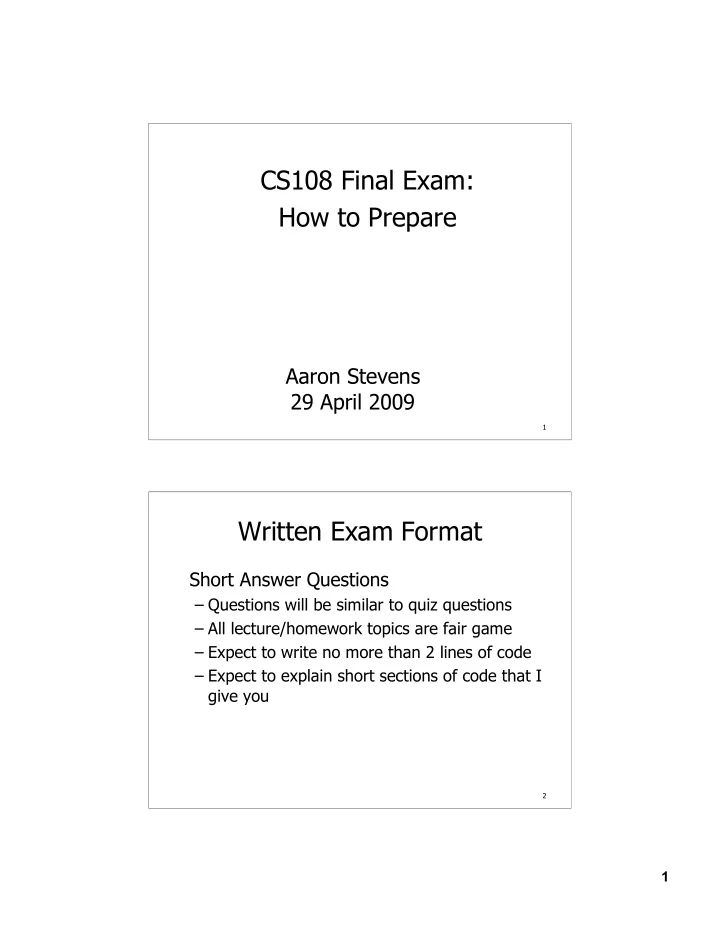

CS108 Final Exam: How to Prepare Aaron Stevens 29 April 2009 1 Written Exam Format Short Answer Questions – Questions will be similar to quiz questions – All lecture/homework topics are fair game – Expect to write no more than 2 lines of code – Expect to explain short sections of code that I give you 2 1
Written Exam Format True/False and Explain Why Questions – 10 questions worth 3 points each – 1 point for T/F, 2 points for explanation – Explain in one sentence: either state what’s true/false or give an example 3 How to Study: Active Recall You can anticipate and prepare for the questions that will likely be on the exam… – You know the questions I’ve already asked. – You can review the lecture notes to see which concepts I missed on the quizzes. – You know the style of questions, why not write your own? 4 2
Prepare your Answers After you have a list of questions, prepare your answers. – Use the lectures notes. – Reference the reading materials or the web to explain any concepts you have missed. – Ask a friend, discuss the concepts. 5 Practice your Answers After you have prepared your questions and “good” answers… Put the book aside and hide your notes. Then recall everything you can. Write it down, or, if you're uninhibited, say it out loud. Source: “Close the Book. Recall. Write It Down.” Chronicle of Higher Education, May 2009 6 3
Don’t Reread! It is generally a mistake to read and reread a textbook passage. That strategy feels intuitively right to many students, but it's much less effective than active recall, and it can give rise to a false sense of confidence. Source: Mark A. McDaniel, a professor of psychology at Washington University in St. Louis, author of a study in the May 2009 of Contemporary Educational Psychology . Source: “Close the Book. Recall. Write It Down.” Chronicle of Higher Education, May 2009 7 Professor Karpicke… "When you've got your chemistry book in front of you, everything's right there on the page, it's all very familiar and fluent." Jeffrey D. Karpicke, an assistant professor of psychology at Purdue University and lead author of a paper in the May issue of Memory about students' faulty intuitions about effective study habits. Source: “Close the Book. Recall. Write It Down.” Chronicle of Higher Education, May 2009 8 4
Professor Karpicke, cont. "So you could say to yourself, 'Yeah, I know this. Sure, this is all very familiar,'" Mr. Karpicke continues. "But of course, when you go in to take a classroom test, or in real life when you need to reconstruct your knowledge, the book's not there. In our experiments, when students repeatedly read something, it falsely inflates their sense of their own learning.” Source: “Close the Book. Recall. Write It Down.” Chronicle of Higher Education, May 2009 9 Isn’t that rote memorization? "I don't think these techniques will necessarily result in rote memorization," Mr. McDaniel says. "If you ask people to free-recall, you can generate a better mental model of a subject area, and in turn that can lead to better problem-solving.” Source: “Close the Book. Recall. Write It Down.” Chronicle of Higher Education, May 2009 10 5
Student To Dos: Final Exam @ MCS 148 Tuesday 5/5 12:30-2:30 pm Lab Exam: Thursday 4/30 – 75 minutes, 3 mandatory questions Covered: Input/output, arithmetic, strings, functions, decisions, repetition, lists. Not covered: graphics, classes, database, web applications, graphical user interface – write functions to encapsulate the code for each answer – main code will be provided to you 11 6
Recommend
More recommend